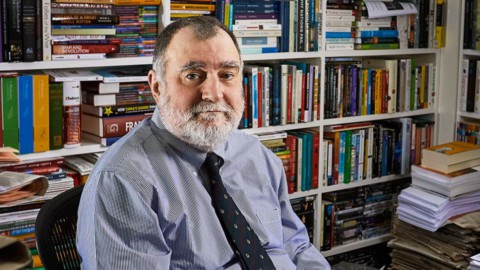La crescita dell’economia italiana, dopo la gravissima crisi del 2008-2009, pare inchiodata nell’intorno dell’1 per cento, decimale più, decimale meno. Questo accade mentre altri corrono: tutti i «paesi emergenti», vecchi e nuovi, che rappresentano ormai un insieme molto più ampio e variegato dei famosi Bric (abbiamo, per restare a Goldman Sachs, i «Next-11» e poi quelli che l’Economist ha chiamato i «nuovi paesi emergenti», a loro volta suddivisi in «trascurati» e «di frontiera»).
E più vicino a noi corre, com’è ampiamente noto, la Germania, un’economia legata a quella italiana da un fitto reticolo di relazioni fra imprese che sono, a un tempo, di cooperazione e di competizione.
La nuova edizione di Scenari industriali del Centro Studi Confindustria (CSC, n. 2, giugno 2011) – appena pubblicato – aiuta a gettare luce proprio sulla nuova «mappa manifatturiera globale». Ebbene, tra il 2007 e il 2010 nelle quote della produzione industriale mondiale «l’Italia è scesa dal 4,5% al 3,4%», passando «dal 5° al 7° posto nel Mondo; resta seconda in Europa dietro la Germania». Si annota altresì come l’Italia sia «l’ottavo esportatore mondiale di merci, il quarto in Europa». Infine, si ricorda come la specializzazione industriale italiana abbia «continuato a virare verso la fabbricazione di beni non direttamente riconducibili all’insieme costituito da moda-abbigliamento-arredamento»: nelle esportazioni prevalgono i macchinari ed è aumentata l’incidenza della chimica-farmaceutica.
Naturalmente il rapporto del CSC – curato da Luca Paolazzi e Fabrizio Traù – evidenzia tutta una serie di aspetti negativi della nostra struttura industriale (la perdita di competitività, la bassa redditività, e così via), che rendono il quadro tutt’altro che roseo.
Eppure, riflettere anzitutto su quello che siamo (ampiamente nei primi dieci paesi al mondo per produzione industriale ed export) dovrebbe aiutare a orientare le decisioni nella giusta direzione. Le decisioni delle imprese – piccole, medie o grandi che siano – vengono abitualmente chiamate «strategie», e di esse dà conto lo stesso rapporto confindustriale grazie ai Focus Group realizzati dal CSC: l’innovazione viene ormai percepita come un imperativo categorico.
Ma è giunto il tempo di mettere in pratica anche altre decisioni: non già quelle degli operatori privati (il vento della competizione globale li ha indotti ad agire), bensì quelle dei policy-maker; il che, per restare nel dominio di competenze di cui stiamo parlando, significa che per il Paese è arrivato il tempo di darsi una nuova politica industriale. Mai area di policy fu più criticata – meglio sarebbe dire, disprezzata – negli anni del dominio assoluto del «pensiero unico»; certo, anche per gli errori che nella gestione della (vecchia) politica industriale furono commessi. Ma siamo poi così sicuri che, nel negare ogni utilità a questa policy, non vi fosse anche un pregiudizio intellettuale?
Sia come sia, credo che oggi un’impostazione moderna debba rifarsi, da un lato, ai lavori (e all’esperienza a Bruxelles accanto al presidente Delors) del compianto Alexis Jacquemin e, dall’altro, ai più recenti insegnamenti di Dani Rodrik della JFK School of Government. In precedenti lavori sulle pagine de “il Mulino” (rivista: n. 1/2011; edizione on-line: 21/7/2010) ho avuto modo di soffermarmi su questa impostazione, che per semplicità possiamo chiamare a’ la Jacquemin-Rodrik.
Che il tentativo per una nuova politica industriale, dopo la positiva ma purtroppo brevissima stagione di Industria 2015, sia stato abbandonato proprio da quello che resta il secondo Paese manifatturiero d’Europa (e 7° nel mondo) ha dell’incredibile.
C’è una pedagogia che esce dal crac del 2008 e dai difficilissimi anni che ne sono seguiti; questa: la prosperità – al contrario dei diamanti della pubblicità – non è per sempre. Al contrario, essa va coltivata con pazienza e lungimiranza. E l’esercizio riesce meglio a quelle nazioni che fondano la loro ricchezza sull’economia reale, e la manifattura in primis. Il merito del rapporto del CSC, oltre ai tanti dati offerti alla comune riflessione, è quello di ricordare questa semplice verità; ossia, che l’industria riveste «un ruolo vitale».
Non è per un accidente della storia, crediamo, che le strategie delle imprese (così come prefigurate dagli stessi imprenditori) e le nuove politiche industriali (se correttamente implementate) convergano soprattutto su un punto: la necessità di aumentare gli investimenti in conoscenza. Un piccolo esempio che ci viene da Bologna può essere di aiuto nell’illustrare questo punto. Qualche giorno addietro, in occasione dell’evento per il passaggio di consegne fra la presidente uscente di Confindustria Emilia-Romagna, Anna Maria Artoni, e il nuovo presidente, Gaetano Maccaferri, il CSC ha presentato i suoi Scenari Industriali e un gruppo di imprenditori ha discusso i principali temi lì evocati. Fra di loro, Nerio Alessandri – fondatore della cesenate Technogym – ha indicato nell’aumento delle spese in R&S dal 5% al 7% del fatturato la strategia fondamentale perseguita. Andrea Chiesi, della parmigiana Chiesi Farmaceutici, ha dato conto dell’ormai prossima inaugurazione del nuovo centro ricerche, che significa un investimento di oltre 70 milioni di euro per un Gruppo che, annualmente, investe il 14-15% del fatturato in R&S. Entrambe, Technogym e Chiesi Farmaceutici, appartengono significativamente a settori non tradizionali per l’industria italiana ed emiliano-romagnola.
Pensiamo a che cosa sarebbe l’Italia se la nuova politica industriale marciasse nella stessa direzione delle strategie delle imprese che sanno guardare al futuro, dando loro l’appropriato supporto per la ricerca, l’innovazione e la formazione di capitale umano di qualità. In una parola, pensiamo a che cosa sarebbe l’Italia se anziché disperdere le (poche) risorse nei mille rivoli delle leggi ad hoc, delle agevolazioni varie, delle iniziative regionalistiche (o peggio localistiche), le concentrasse in una grande iniziativa plasmata sul modello del Fraunhofer Institute, di cui oggi per fortuna molto si dibatte nel Paese. Prima di edificare il nuovo Istituto, diffondendolo – a somiglianza dell’originale tedesco – sul territorio, occorrerebbe avere il coraggio di chiudere le cose vecchie. Ma questo è il compito autentico della Politica, questa volta scritta senza aggettivazioni.
La modesta crescita di cui si diceva all’inizio non va vissuta come un destino naturale. D’altro canto, per tornare a crescere è richiesta una ricetta dai molti ingredienti; possiamo però affermare, per restare nella metafora, che il lievito – oggi più di ieri – è certamente costituito dalla ricerca scientifica (di base e applicata) e dal trasferimento delle nuove conoscenze al mondo della produzione.




